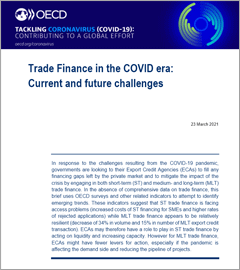Export credits
Export credits work at the OECD
Governments provide officially supported export credits through Export Credit Agencies (ECAs) in support of national exporters competing for overseas sales. Such support can take the form either of “official financing support”, such as direct credits to foreign buyers, refinancing or interest-rate support, or of “pure cover support”, such as export credits insurance or guarantee cover for credits provided by private financial institutions. ECAs can be government institutions or private companies operating on behalf of governments.
The OECD has a long tradition of rule-making in the area of officially supported export credits, dating back to 1963.
The Export Credits Group
The OECD provides a forum for exchanging information on Members’ export credits systems and business activities and for discussing and coordinating national export credits policies relating to good governance issues, such as anti-bribery measures, environmental and social due diligence, and sustainable lending. These discussions take place under the auspices of the Working Party on Export Credits and Credit Guarantees (the “Export Credits Group”, or ECG). All OECD Members are ECG Members, except Chile, Costa Rica and Iceland.
The Arrangement on Officially Supported Export Credits
The OECD is also a forum for maintaining, developing and monitoring the financial disciplines for export credits, which are contained within the Arrangement on Officially Supported Export Credits (the “Arrangement”). These disciplines stipulate the most generous financial terms and conditions that Members may offer when providing officially supported export credits. Discussions relating to the Arrangement take place under the auspices of the Participants to the Arrangement on Officially Supported Export Credits (the “Participants”). The Participants are composed of Australia, Canada, the European Union, Japan, Korea, New Zealand, Norway, Switzerland, Turkey, the United Kingdom and the United States.
The resulting export credits disciplines apply first and foremost to OECD Members; however, several key non-Members regularly observe meetings of the ECG and the Participants. In addition, adherence to any of the OECD export credits disciplines (de facto and de jure) by any non-Members on a voluntary basis would be welcomed and, in this regard, the OECD Export Credits Secretariat is ready to assist non-Members in any way.
Lastly, both the ECG and the Participants consult with relevant stakeholders, such as non-governmental organisations, business and banking groups, labour unions, and other international organisations, on an annual basis and in one-off special sessions when negotiating revised disciplines.
Consultation with Civil Society Organisations
The ECG and the Participants organise an annual Consultation or Forum with representatives from Civil Society Organisations (CSOs), including from business organisations, banking associations, trade union representatives and non-governmental organisations (NGOs). The purpose of these events is to update CSOs on recent developments relating to export credits and to obtain CSOs’ views on issues being discussed by the Export Credits Committees.
News
Modernisation of the Arrangement on Export Credits
The Participants to the OECD Arrangement on Officially Supported Export Credits are currently negotiating to modernise their rules on the financial terms and conditions for officially supported export credits.
The modernisation is being pursued (i) with the aim of making Arrangement financing flexible enough to continue providing support to transactions in an evolving world, where the challenges posed by the economic and financial needs of projects and the competitive landscape are growing; and (ii) in the context of COP27, to support a wider range of climate-friendly transactions through more generous financial terms and conditions.
The Participants hope to reach an agreement in March 2023.
Temporary down payment flexibility
The Participants agreed (via a Common Line) to decrease the minimum down payment from 15% to 5% for public buyers (with sovereign guarantee) in category II countries for one year as of 5 November 2021. This common line has been extended for one year on 4 November 2022.
Updates
- 19 January 2023:
- Prevailing Calculator for Market Benchmark MPR [2023] (valid from 1st February 2023 to 31 January 2024)
- 11 January 2023:
- Update of the Margin Benchmark (MB) for civil aircraft and Quaterly update of the Minimum Premium Rates, applicable as of 15 January 2023.
- Prevailing CIRRs, CIRRs for transactions supported according to CCSU or NSU, Premium Discount Rates, prevailing ASU CIRRs and prevailing Differentiated Discount Rates as of 15 January 2023.
Key publications
- Analysis of the responses provided by Members of the OECD Working Party on Export Credits and Credit Guarantees (ECG) as at end-November 2021 to a Survey of climate-related and sustainability-related policies and practices.
- Trade finance in the COVID era: Current and future challenges
- Trade Finance in times of crisis: responses from ECAs’
- A Compendium of Good Governance Export Credits Instruments
- Export Credits and the CORONA Virus Sanitary Crisis in 2020: Survey of Measures Taken
- Export Credits and the CORONA Virus Sanitary Crisis in 2020: Summary of the Responses to the Survey
COVID brief
Policy brief
Export credits publications
Access all OECD publications on export credits on the OECD iLibrary.
Access all trade publications
All of our trade research and analysis is available to read online for free on the OECD iLibrary
Sign-up for our trade newsletter
Sign-up to our newsletter to receive periodic e-mail updates on new publications, videos and analysis.
Contact us with your questions
If you have questions about Export credits at OECD, please contact the Export Credits Secretariat via e-mail.

